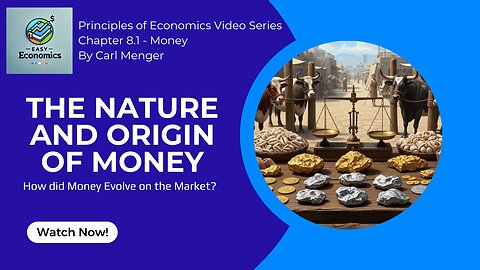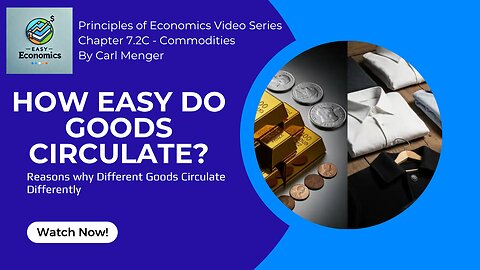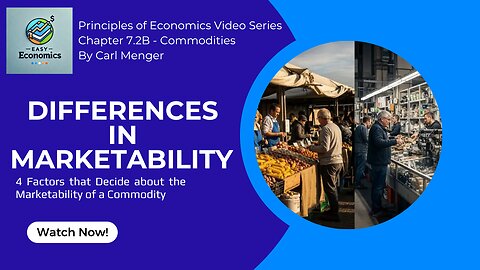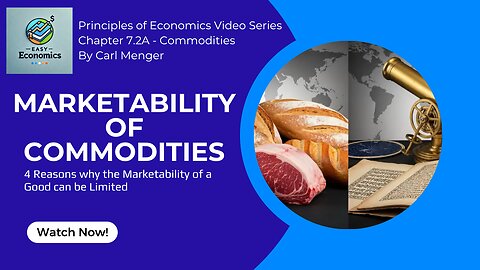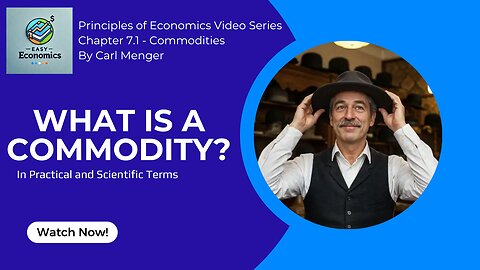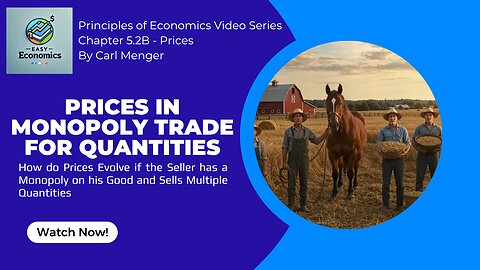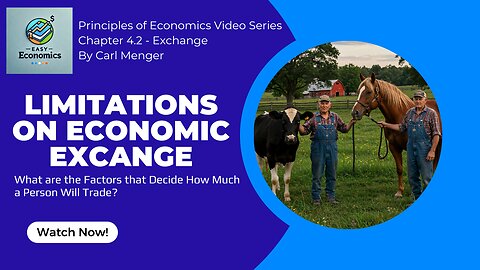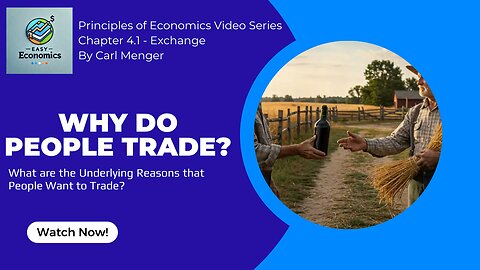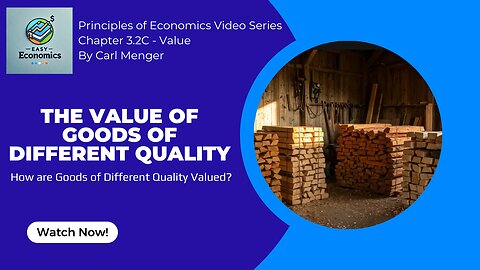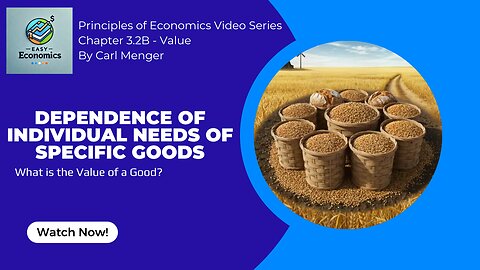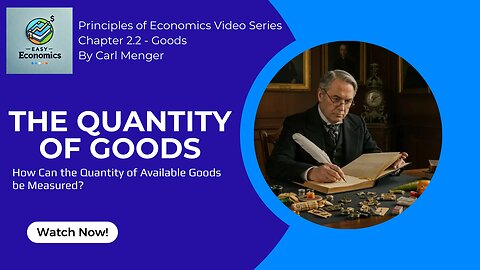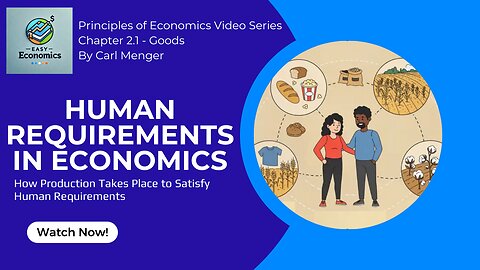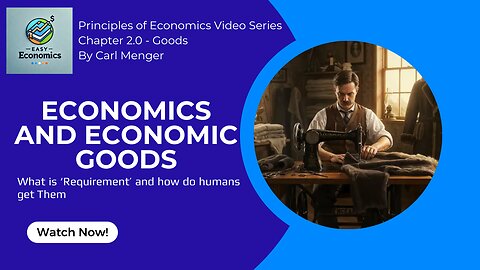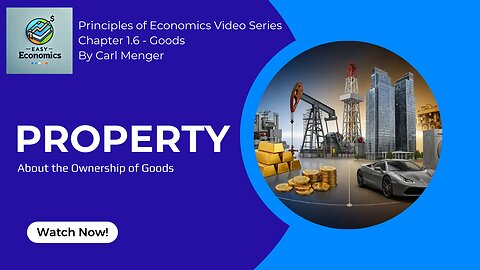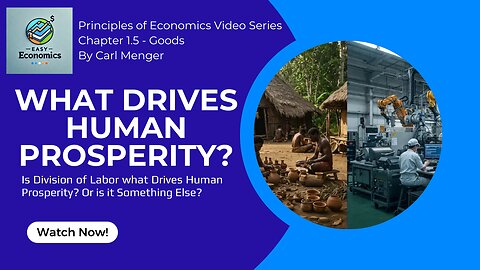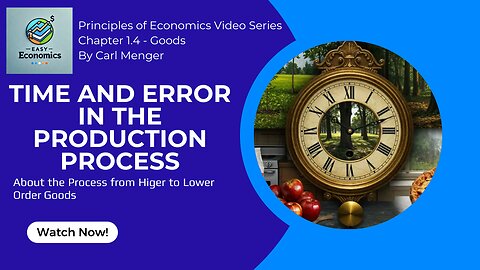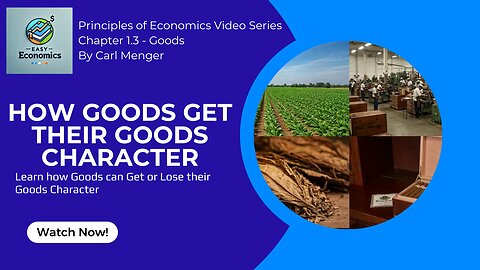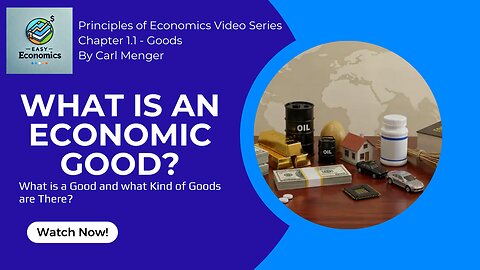Premium Only Content
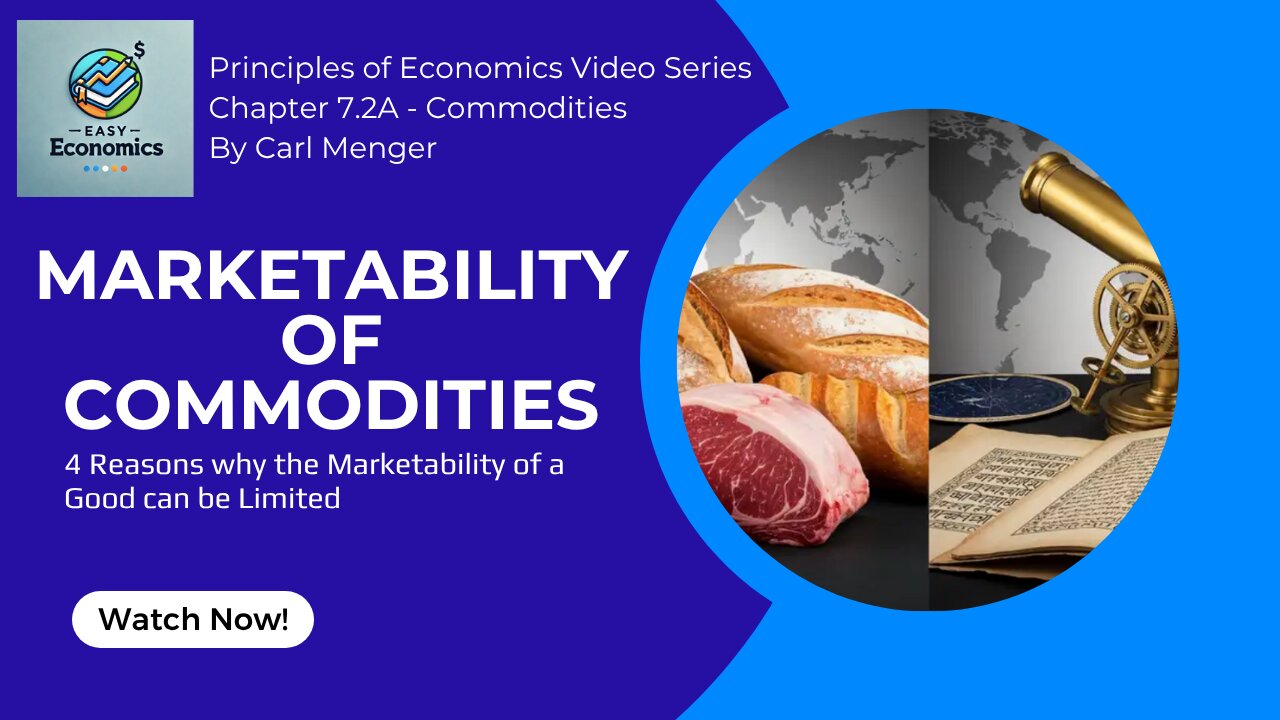
Principles of Economics by Carl Menger Chapter 8.1 - The Nature and Origin of Money
Principles of Economics by Carl Menger Chapter 7.2C - Circulability of Commodities
Principles of Economics by Carl Menger Chapter 7.2B - Differences in Marketability of Commodities
Principles of Economics by Carl Menger Chapter 7.2A - Marketability of Commodities
Principles of Economics by Carl Menger Chapter 7.1 - What is a Commodity?
Principles of Economics by Carl Menger Chapter 5.3C - Competition Policy
Principles of Economics by Carl Menger Chapter 5.3B - Price Formation by Competing Sellers
Principles of Economics by Carl Menger Chapter 5.3A - Price Forming and Distribution by Competition
Principles of Economics by Carl Menger Chapter 5.2D - Principles of Monopoly Trade
Principles of Economics by Carl Menger Chapter 5.2C - Market Dynamics of Monopoly Pricing
Principles of Economics by Carl Menger Chapter 5.2B - Price Forming in Monopoly Trade for Quantities
Principles of Economics by Carl Menger Chapter 5.2A - Price Formation in Monopoly Trade
Principles of Economics by Carl Menger Chapter 5.1 - Price Formation in Isolated Exchange
Principles of Economics by Carl Menger Chapter 5.0 - The Theory of Price
Principles of Economics by Carl Menger Chapter 4.2 - The Limits of Economic Exchange
Principles of Economics by Carl Menger Chapter 4.1 - Foundations of Economic Exchange
Principles of Economics by Carl Menger Chapter 3.3E - The Value of Land, Labour and Capital
Principles of Economics by Carl Menger Chapter 3.3D - The Value of Individual Higher Order Goods
Principles of Economics by Carl Menger Chapter 3.3C - Combined Value of Higher Order Goods
Principles of Economics by Carl Menger Chapter 3.3B - The Productivity of Capital
Principles of Economics by Carl Menger Chapter 3.3A - What Causes the Value of Higher Order Goods?
Principles of Economics by Carl Menger Chapter 3.2D - The Subjective Nature of the Measure of Value
Principles of Economics by Carl Menger Chapter 3.2C - Influence of the Quality of Goods on Value
Principles of Economics by Carl Menger Chapter 3 2B - The Value of Goods for Individual Needs
Principles of Economics by Carl Menger Chapter 3.2A - Difference in Importance for Individual Needs
Principles of Economics by Carl Menger Chapter 3.1 - The Theory of Value
Principles of Economics by Carl Menger Chapter 2.4 - What is Wealth?
Principles of Economics by Carl Menger Chapter 2.3 - Human Economy and Economic Goods
Principles of Economics by Carl Menger Chapter 2.2 - Available Quantities of Goods
Principles of Economics by Carl Menger Chapter 2.1 - Human Requirements in Economics
Principles of Economics by Carl Menger Chapter 2.0 - Economy and Economic Goods
Principles of Economics by Carl Menger Chapter 1.6 - Ownership of Goods
Principles of Economics by Carl Menger Chapter 1.5 - Causes of Human Prosperity
Principles of Economics by Carl Menger Chapter 1.4 -Time and Error in the Production Process
Principles of Economics by Carl Menger Chapter 1.3 - The Laws that Govern Goods Character
Principles of Economics by Carl Menger Chapter 1.2 - The Causal Connection Between Goods
Principles of Economics by Carl Menger Chapter 1.1 - The Nature of Goods
Principles of Economics by Carl Menger Chapter 7.2A - Marketability of Commodities
You want to read the book? Get it here: 👉
https://amzn.to/4exiAKW
Watch the next video in this series: https://rumble.com/v6vgvk5-principles-of-economics-by-carl-menger-chapter-7.2b-differences-in-marketab.html
Watch the video series from the start: https://rumble.com/playlists/I48mBTB4w2c
Watch our video about Carl Menger: https://rumble.com/v61z0l2-carl-menger-the-father-of-austrian-economics-and-subjective-value.html
Why are some goods easy to sell while others barely move at all? In this video, we explore Carl Menger’s Principles of Economics, Section 7.2A: On the Limits of Marketability of Commodities.
While many economic theories focus on why goods are exchanged in certain quantities, Menger draws attention to something more practical: not all goods are equally marketable. That is, not all goods are equally easy to sell. And understanding this difference is essential—not just for producers and traders—but for grasping why money exists.
Menger outlines four key limits that define a commodity’s marketability:
1️⃣ Buyer limitations: Not everyone can buy every good. Bread is easy to sell to anyone—rare tools or obscure books, not so much.
2️⃣ Geographic limits: Some goods (like steel or gold) can be shipped anywhere, while others (like manure or sand) are only profitable locally.
3️⃣ Quantity constraints: You can sell bread by the ton, but not everyone wants 1,000 Sanskrit textbooks. Some markets are naturally small.
4️⃣ Time sensitivity: Perishable or seasonal goods lose value fast. Others, like precious metals, hold their value over time.
This analysis helps explain why some goods become money—they’re durable, portable, in demand, and easy to sell anytime, anywhere.
Whether you’re a producer, investor, or just curious about how markets work, understanding these marketability factors is key to making better economic choices.
❓ Questions This Video Answers:
-What does "marketability" mean in economics?
-Why are some goods easier to sell than others?
-How does geography limit trade?
-What role does time play in a product’s marketability?
-Why are some goods only profitable in certain regions?
-How does quantity affect how easily something can be sold?
-What kinds of goods are most durable in value over time?
-Why is understanding marketability essential for economic planning?
-What makes a good ideal for use as money?
-How do perishable vs. non-perishable goods compare in trade?
00:00 - Introduction to Marketability Limits
00:11 - Marketability of Goods
00:45 - The Four Limits of Marketability
01:59 - Quantity and Time Constraints
03:22 - Conclusion
03:38 - Outro
#Marketability #CommodityTrade #CarlMenger
-
 1:25:03
1:25:03
Jeff Ahern
5 hours ago $16.99 earnedThe Saturday Show with Jeff Ahern
66.8K8 -
 1:31:56
1:31:56
Michael Franzese
20 hours agoWill NBA do anything about their Gambling Problems?
127K26 -
 57:26
57:26
X22 Report
10 hours agoMr & Mrs X - The Food Industry Is Trying To Pull A Fast One On RFK Jr (MAHA), This Will Fail - EP 14
99.5K68 -
 2:01:08
2:01:08
LFA TV
1 day agoTHE RUMBLE RUNDOWN LIVE @9AM EST
157K15 -
 1:28:14
1:28:14
On Call with Dr. Mary Talley Bowden
8 hours agoI came for my wife.
39K34 -
 1:06:36
1:06:36
Wendy Bell Radio
13 hours agoPet Talk With The Pet Doc
75K36 -
 30:58
30:58
SouthernbelleReacts
3 days ago $9.39 earnedWe Didn’t Expect That Ending… ‘Welcome to Derry’ S1 E1 Reaction
50.8K12 -
 13:51
13:51
True Crime | Unsolved Cases | Mysterious Stories
5 days ago $20.84 earned7 Real Life Heroes Caught on Camera (Remastered Audio)
65K17 -
 LIVE
LIVE
Total Horse Channel
19 hours ago2025 IRCHA Derby & Horse Show - November 1st
61 watching -
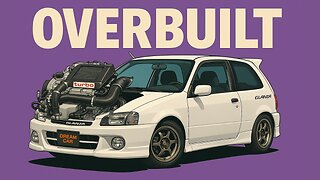 4:19
4:19
PistonPop-TV
6 days ago $8.35 earnedThe 4E-FTE: Toyota’s Smallest Turbo Monster
48.6K3
